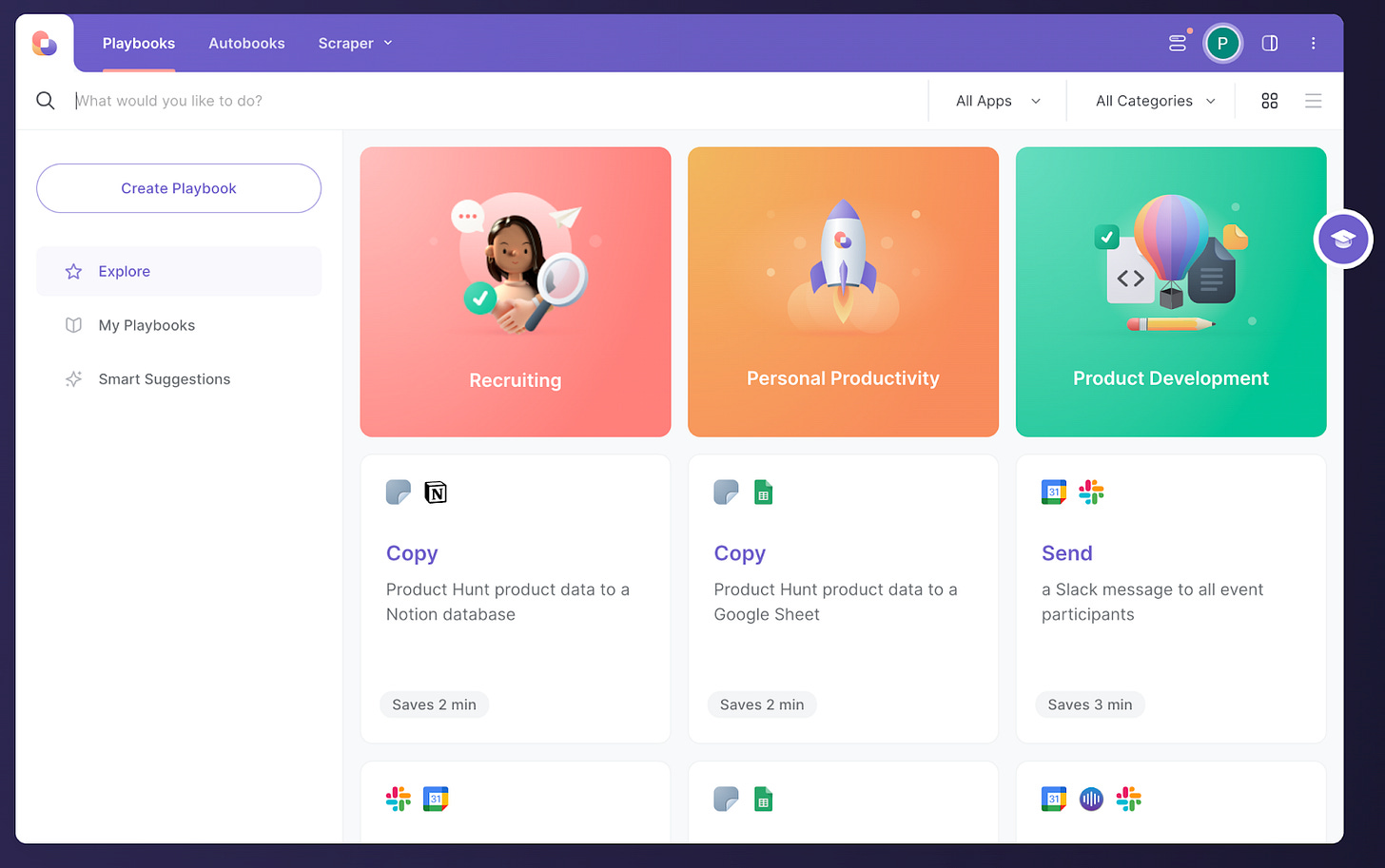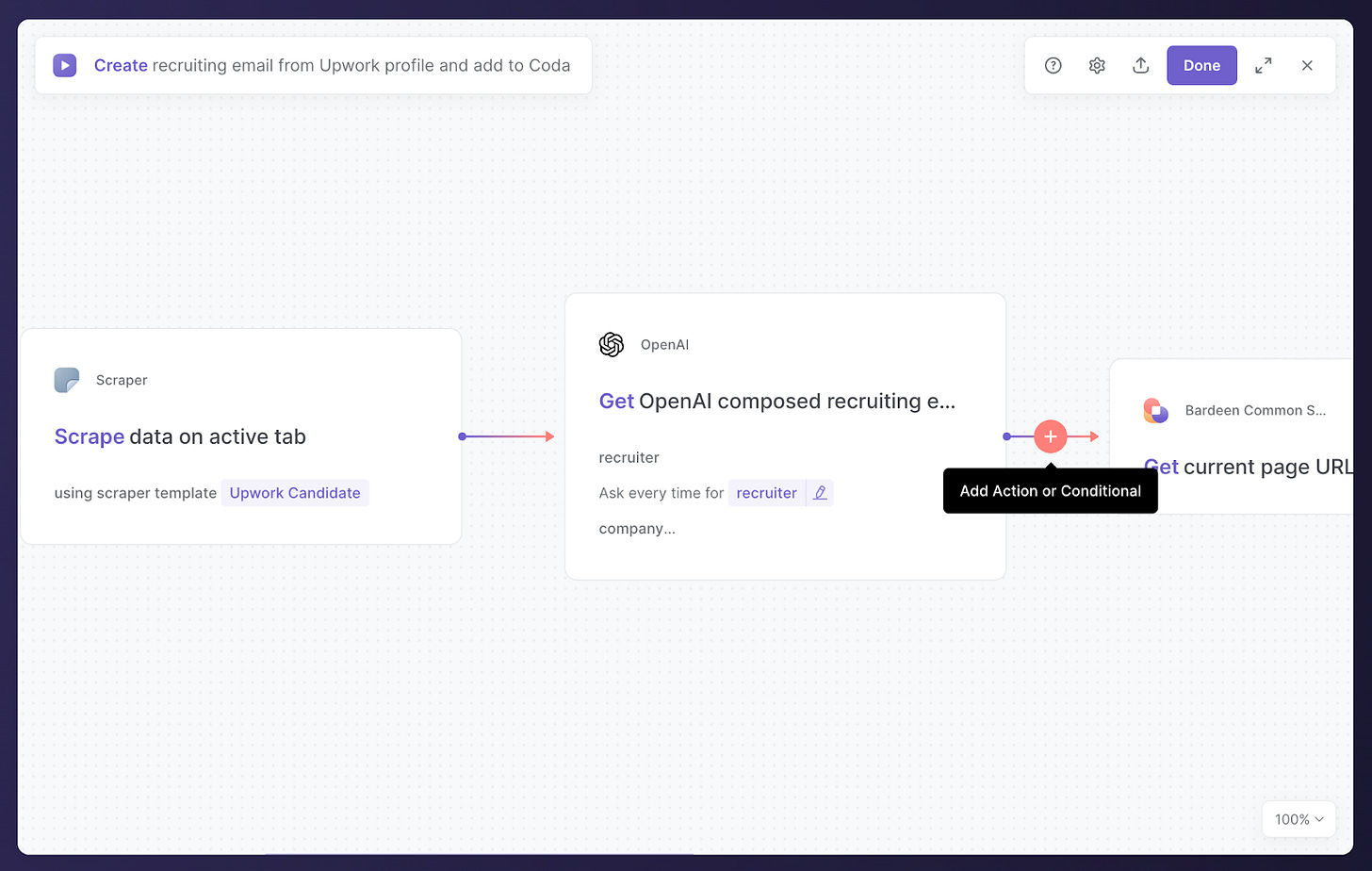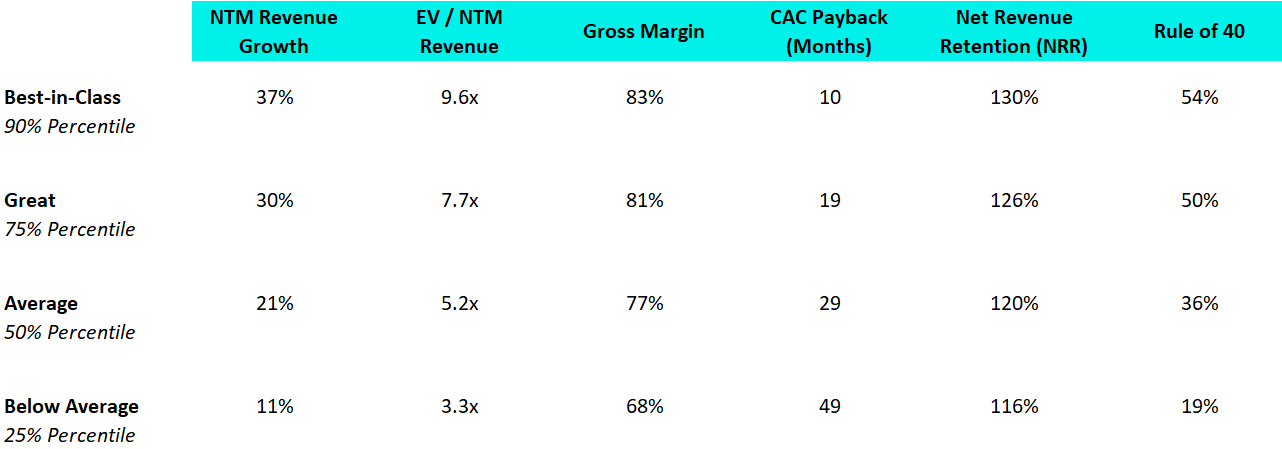NPLG 3.16.23: Automating Manual Tasks with AI (Bardeen)
The best PLG founders, startups, strategies, metrics and community. Every week.
Current subscribers: 6,386, +71 since last week (+1.1%)
Share the PLG love: please forward to colleagues and friends! 🙏
NPLG Startup of the Week: Bardeen
Picture this: You're sitting at your desk, sipping your morning coffee, and ready to dive into the day's tasks. But instead of tackling your to-do list, you find yourself stuck in an endless loop of copy-pasting, app-switching, and grinding through mundane admin tasks. Your precious time slips away, and before you know it, you're burnt out and buried under a mountain of uncompleted tasks.
Bardeen.ai is on a mission to give users across the organization their time back, so they can focus on their true job functions and skill sets. The startup’s personalized AI assistant helps automate workflows between tools with customizable automation “Playbooks,” and an intuitive no-code builder to create your own. Bardeen’s vision is to create your very own “copilot for work” that takes annoying repeatable tasks off your plate; the more automations you build with it, and the more behaviors it observes, the more it will streamline your day-to-day.
Bardeen launched its product a year ago with a very successful Product Hunt debut and has since scaled organically to over 100,000 users. You can try it out for free here.
The team at Bardeen is working on the next generation of the product, which will make it even easier and more intuitive to build and customize automations, using natural language or even by just learning from observing your user behavior. You learn more and sign up for the preview here: https://bardeen.ai/ai.
For this edition of Notorious PLG, CEO and Co-founder Pascal Weinberger shares how PLG is central to the company’s success so far and the essential role of the user community in discovering and sharing the product’s limitless capabilities.
Why PLG for Bardeen?
“In today's fast-paced digital world, it's crucial for companies to adopt a user-centric approach in order to thrive. Bardeen has fully embraced PLG as the driving force behind its success.
But why PLG for Bardeen? Let's explore the key reasons:
Organic Word of Mouth: Bardeen's PLG strategy thrives on the power of organic word of mouth. As users discover the platform's game-changing automations, they share their experiences with coworkers, managers, social media followers, and the Bardeen community. This buzz generates a natural cycle of user-driven growth, fueling the company's expansion, without any ad dollars spent.
User-Centric Development: PLG places the end user at the core of the product development process. By actively engaging with its user community, Bardeen can better understand their needs and preferences, ensuring that the platform evolves in response to real-world feedback. This approach empowers users to actively shape the product's trajectory, making them feel like valued members of the Bardeen team.
Strong Community Ties: Bardeen's PLG model cultivates a strong sense of community among its users. With programs like the ambassador and co-creator initiatives, as well as a dedicated Slack channel, Bardeen creates an ecosystem where users can connect, collaborate, and support one another. This vibrant community fuels the platform's growth, while also fostering user loyalty and enthusiasm.
In summary, Bardeen's commitment to PLG enables the company to harness the power of its user community, ensuring that its AI-powered automation platform remains innovative, user-friendly, and relevant. By placing its users at the heart of the product experience, Bardeen is able to unlock the full potential of its AI assistant and revolutionize the way we work.
How Bardeen does PLG
Bardeen's AI-powered automation platform has been making waves in the world of productivity, and the key to its success lies in its strategic execution of PLG. Here's a look at how Bardeen puts PLG into practice:
Creating User-Friendly Playbooks: Bardeen offers pre-built automation flows, known as "Playbooks," designed to work across multiple apps. These Playbooks and Autobooks allow users of all technical backgrounds to quickly experience the benefits of automation, as they serve as both inspiration and a starting point for customization.
Empowering Users with a No-Code Builder: Bardeen's intuitive no-code builder enables users to create their own Playbooks without any coding expertise. This approach democratizes automation and encourages users to experiment, innovate, and share their creations within the Bardeen community and the world.
Promoting Virality and Sharing: Each tested Playbook or automation template has its own landing page on Bardeen's website. Users can easily find the automations they need (via organic search on your favorite search engine), try them out, and then share them with their network or company, all within the same platform. This ease of sharing contributes to the organic growth and word-of-mouth marketing that fuels Bardeen's PLG strategy.
Engaging Users through Contests and Incentives: Bardeen actively engages its user community by hosting contests, offering incentives, and giving shout-outs to users who share their automation discoveries or contribute new ideas. These initiatives encourage users to explore the platform further, leading to greater user satisfaction and attracting new users to the Bardeen ecosystem. A great example of this is the recent one-year-anniversary campaign and contest.
Fostering a Collaborative Community: Bardeen cultivates a strong sense of community among its users by providing dedicated spaces for collaboration and support. For example, the company operates a community-wide Slack channel where users can share custom use cases, discuss product tips, and seek assistance from fellow users or the Bardeen team.
Collaborating with Ambassadors and Co-Creators: Bardeen partners with select users through its ambassador and co-creator programs, working closely with them to develop content and automation guides. This collaborative approach not only helps refine the platform's offerings but also strengthens users' sense of belonging and investment in the product's success. Some recent examples can be found here and here.
Iterative Development and Continuous Improvement: Bardeen stays agile by continuously developing, testing, and deploying new features, improving the usability and adding new app integrations based on its user’s feedback and interactions. By keeping its finger on the pulse of user needs and evolving use cases, and making it possible for everyone at the company to interact with and support users, the company ensures that its platform remains relevant, intuitive, and aligned with users' ever-changing demands.
Bardeen's success in executing PLG lies in its commitment to empowering users, fostering a strong sense of community, and continuously iterating on its product based on real-world feedback. By placing its users at the center of the product experience, Bardeen has created an AI-powered automation platform that is truly shaped by the people who use it every day.
I would love feedback. Please hit me up on twitter @zacharydewitt or email me at zach@wing.vc. If you were forwarded this email and are interested in getting a weekly update on the best PLG companies, please join our growing community by subscribing:
PLG Benchmarking (Startups):
This is a new section! I will continue to update these metrics and add new metrics. I would love your feedback on what else I should track.
Conversion rate (website → free user):
Best: 10%
Good: 5%
Activation rate (free user → activated user):
Best: 60%
Good: 30%
Paid conversion rate (free user → paid user):
Best: 8%
Good: 4%
Enterprise conversion rate (free user → enterprise plan):
Best: 4%
Good: 2%
3-month user retention (% of all users still using product after 3 months):
Best: 30%
Good: 15%
Conversion from website to free user:
<1 month on waitlist: ~50%
>3 months on waitlist: 20%
For more detail on acqusition rates by channel (Organic, SEM, Social etc), please refer to this prior NPLG.
PLG Financial Benchmarking (Public PLG Companies):
Financial data as of previous business day market close.
Best-in-Class PLG Benchmarking:
15 Highest PLG EV / NTM Multiples:
15 Biggest PLG Stock Gainers (1 month):
Complete Notorious PLG Dataset (click to zoom):
Note: TTM = Trailing Twelve Months; NTM = Next Twelve Months. Rule of 40 = TTM Revenue Growth % + FCF Margin %. GM-Adjusted CAC Payback = Change in Quarterly Revenue / (Gross Margin % * Prior Quarter Sales & Marketing Expense) * 12. Recent IPOs will have temporary “N/A”s as Wall Street Research has to wait to initiate converge.
Recent PLG Financings (Private Companies):
Seed:
Svix, a webhooks-as-a-service platform designed to make webhooks easy and ubiquitous, has raised $10.4M. The round was led by Andreessen Horowitz, with participation from Y Combinator and Aleph.
Series A:
Threecolts, a company making software for brands and retailers to manage their Amazon sales channel, has raised $90M. Crossbeam Venture Partners and General Global Capital led the round, with participation from Stratos and CoVenture.
Vantage, a cost management platform intended to focus on developer experience and cost transparency, has raised $21M at a $141M valuation. The round was led by Scale Venture Partners, with participation from Andreessen Horowitz and Harpoon Ventures.












